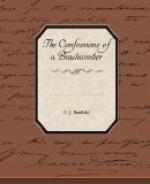Quite a long list of pretty fruits might be compiled, and yet not more than half a dozen are edible, and only half that number nice. The majority are bitter and acrid, some merely insipid, and of the various nuts not one is satisfactory.
Why all this profuse vegetation and the anomaly of tempting fruits and nuts cram-full of meat and yet no real food—that is, food for man? Is it that man was an after-thought of Nature, or did Nature fulfil herself in his splendid purpose and capacities? She supplies abundantly food convenient for birds and other animals lower in the scale of life, but man is left to master his fate. Even when uncivilised he is called upon to exercise more or less wit before he may eat, and the higher his grade the more stress upon his intelligence.
When one contemplates the unpromising origin of the apple of today, and the rich assortment of fruits here higher in the scale of progression than it, imagination delights to dwell upon the wonders which await the skill of a horticultural genius. The crude beginnings of scores of pomological novelties are flaunted on every side. The patient man has to come.
EARLY HISTORY
To that grand old mariner, Captain Cook, belongs the honour of the discovery of the island. The names that he bestowed—judicious and expressive—are among the most precious historic possessions of Australia. They remind us that Cook formed the official bond between Britain and this great Southern land, and bear witness to the splendid feats of quiet heroism that he performed, the privations that he and his ship’s company endured, and the patience and perseverance with which difficulties were faced and overcome.




